
Damon Francis Knight was an American science fiction author, editor, and critic. He is the author of "To Serve Man", a 1950 short story adapted for The Twilight Zone. He was married to fellow writer Kate Wilhelm.

The Body Snatchers is a science fiction horror novel by American writer Jack Finney, originally serialized in Collier's magazine in November–December 1954 and published in book form the following year.
This is a bibliography of works by Damon Knight.

The Tritonian Ring and Other Pusadian Tales is a 1953 collection of stories by American science fiction and fantasy author L. Sprague de Camp, first published in hardcover by Twayne Publishers. An E-book edition was published as The Tritonian Ring and Other Pasudian [sic] Tales by Gollancz's SF Gateway imprint on September 29, 2011 as part of a general release of de Camp's works in electronic form. The pieces were originally published between 1951 and 1953 in the magazines and anthologies Two Complete Science Adventure Books, Fantasy Fiction, Imagination Stories of Science and Fantasy, and Fantastic Adventures. The title story, the novel The Tritonian Ring has also been published separately.
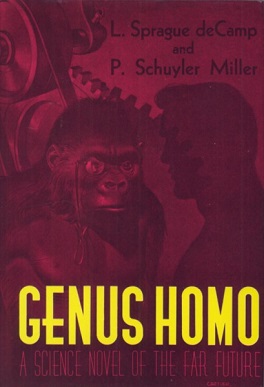
Genus Homo is a science fiction novel by American writers L. Sprague de Camp and P. Schuyler Miller. It was first published in the science fiction magazine Super Science Stories for March, 1941, and subsequently published in book form in hardcover by Fantasy Press in 1950 and in paperback by Berkley Books in 1961. An E-book edition was published by Gollancz's SF Gateway imprint on September 29, 2011 as part of a general release of de Camp's works in electronic form. It has also been translated into French, Italian and German.

The Dreaming Jewels (1950), also known as The Synthetic Man, is a science fiction novel by American writer Theodore Sturgeon. It was his first published novel.

Mutant is a 1953 collection of science fiction short stories by Lewis Padgett. It was first published by Gnome Press in 1953 in an edition of 4,000 copies. The stories all originally appeared in the magazine Astounding.
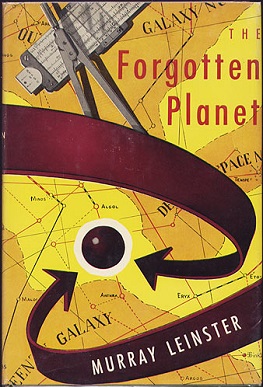
The Forgotten Planet is a science fiction novel by American writer Murray Leinster. It was released in 1954 by Gnome Press in an edition of 5,000 copies. The novel is a fix-up from three short stories, "The Mad Planet" and "The Red Dust", both of which had originally appeared in the magazine Argosy in 1920 and 1921, and "Nightmare Planet", which had been published in Science Fiction Plus in 1953.

The Moon Is Hell! is a collection of two stories, one science fiction, the other sword and sorcery, by American writer John W. Campbell Jr. It was published in 1951 by Fantasy Press in an edition of 4,206 copies. The title story, published for the first time in this collection, deals with a team of scientists stranded on the Moon when their spacecraft crashes, and how they use their combined skills and knowledge to survive until rescue, including building shelter from meteor showers, and creating their own oxygen from Lunar rock. The second story, "The Elder Gods", Campbell rewrote, on a short deadline, from a story by Arthur J. Burks purchased for Unknown but later deemed unsatisfactory. It originally appeared in the October 1939 issue of Unknown under the pseudonym Don A. Stuart. The title of the eponymous story is occasionally found without the exclamation point, but the punctuation is used for the title of most editions of the collection itself.
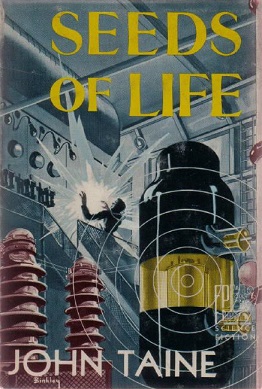
Seeds of Life is a science fiction novel by American writer John Taine. It was first published in 1951 by Fantasy Press in an edition of 2,991 copies. The novel originally appeared in the magazine Amazing Stories Quarterly in October 1931.

Deep Space is a collection of short science-fiction stories by the British writer Eric Frank Russell. It was first published by Fantasy Press in 1954 in an edition of 2,257 copies. The stories originally appeared in the magazines Thrilling Wonder Stories, Other Worlds, Astounding, Galaxy Science Fiction, Imagination and Blue book.

Operation: Outer Space is a science fiction novel by American writer Murray Leinster. It was first published in 1954 by Fantasy Press.
William Milligan Sloane III was an American writer of fantasy and science fiction literature, and a publisher. Sloane is known best for his novel To Walk the Night.

Timeliner is a 1955 science fiction novel by British writer Charles Eric Maine. It was first published in the UK by Hodder & Stoughton; a paperback version by Bantam Books appeared the following year.

In Search of Wonder: Essays on Modern Science Fiction is a collection of critical essays by American writer Damon Knight. Most of the material in the original version of the book was originally published between 1952 and 1955 in various science fiction magazines including Infinity Science Fiction, Original SF Stories, and Future SF. The essays were highly influential, and contributed to Knight's stature as the foremost critic of science fiction of his generation. The book also constitutes an informal record of the "Boom Years" of science fiction from 1950 to 1955.
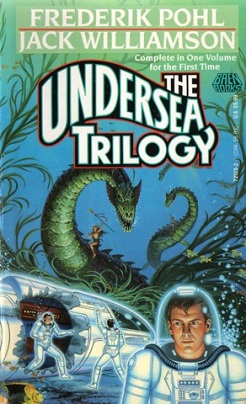
The Undersea Trilogy is a series of three science fiction novels by American writers Frederik Pohl and Jack Williamson. The novels were first published by Gnome Press beginning in 1954. The novels were collected in a single omnibus volume published by Baen Books in 1992. The story takes place in and around the underwater dome city called Marinia. The hero of the stories is cadet Jim Eden of the Sub-Sea Academy.

Angels and Spaceships is a 1954 collection of science fiction and fantasy stories by American writer Fredric Brown. It was initially published in hardcover by E. P. Dutton; a later Bantam paperback edition was retitled Star Shine.
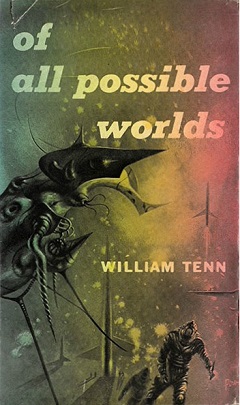
Of All Possible Worlds is a collection of science fiction stories by American writer William Tenn. It was published in hardcover by Ballantine Books in 1955, with a cover by Richard Powers. Ballantine issued paperback editions in 1955, 1960, and 1968; a British hardcover appeared in 1956 with a paperback following in 1963. It was Tenn's first collection.

The Other Side of Here is a science fiction novel by American writer Murray Leinster, first published as a five-part Astounding Stories serial in 1936, under the title "The Incredible Invasion". It was first published in book form, in a "thorough revision", as one side of an Ace Double, in 1955. While no further American editions have been issued, the novel has been translated into Italian, Spanish, French and German. The novels tells the story of "an invasion from the fourth dimension", foiled by an insurrection against the invaders' home government.

The Explorers is a collection of science fiction stories by American writer C. M. Kornbluth, originally published in paperback by Ballantine Books in 1954. Ballantine reissued the collection, which was Kornbluth's first, in 1963. While no further editions of the collection were published, six of its nine stories were included in Ballantine's 1977 The Best of C. M. Kornbluth, and all the stories are contained in NESFA's 1997 His Share of Glory: The Complete Short Science Fiction of C. M. Kornbluth.

















